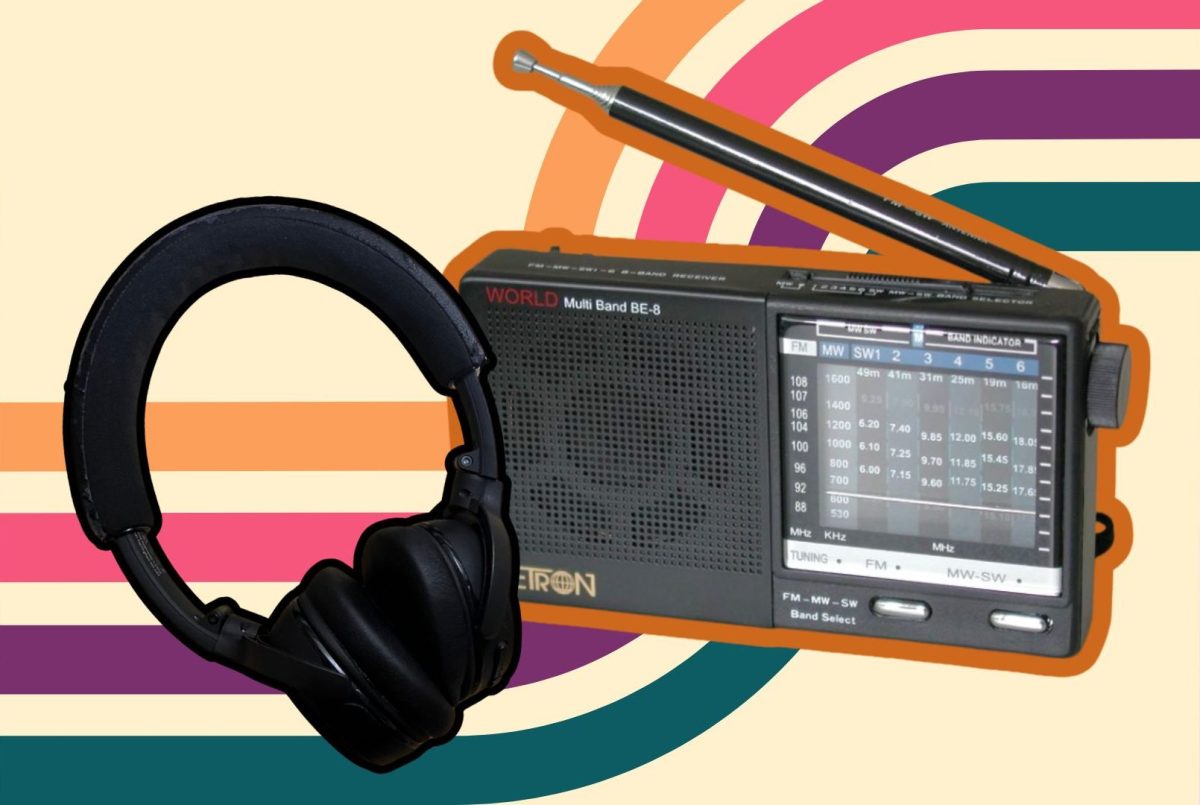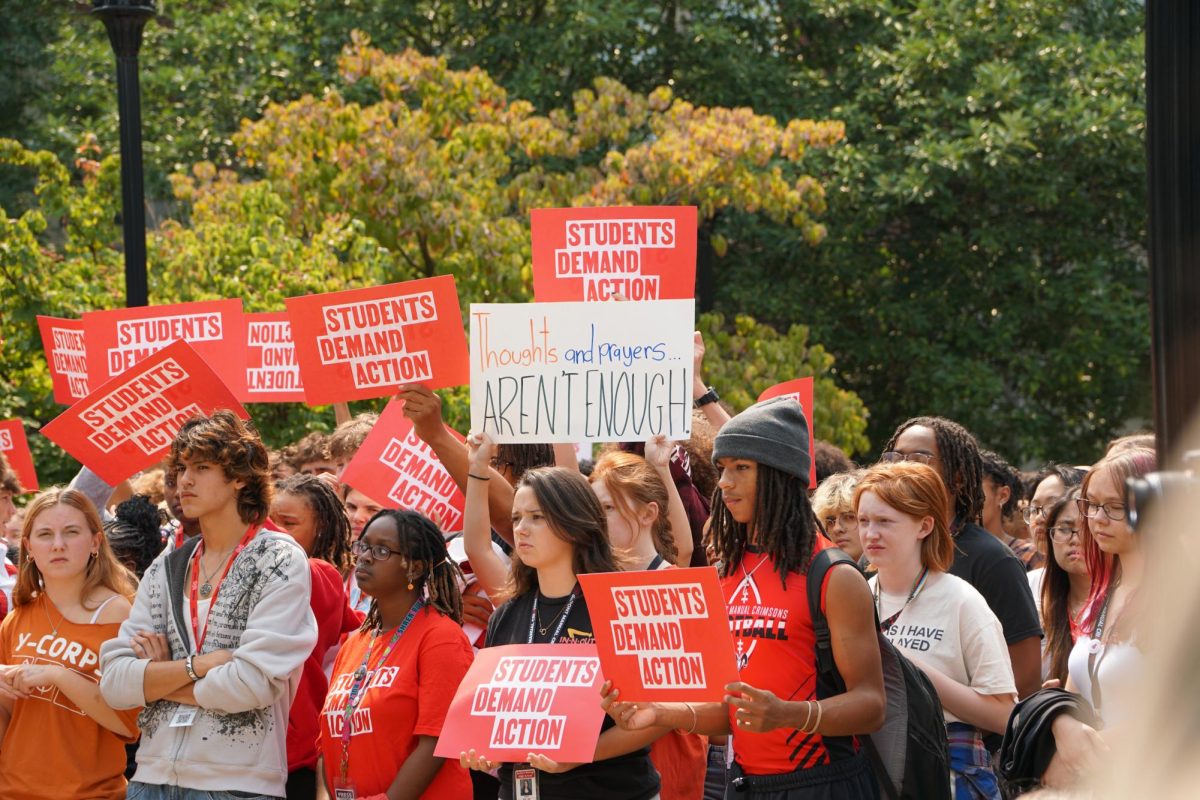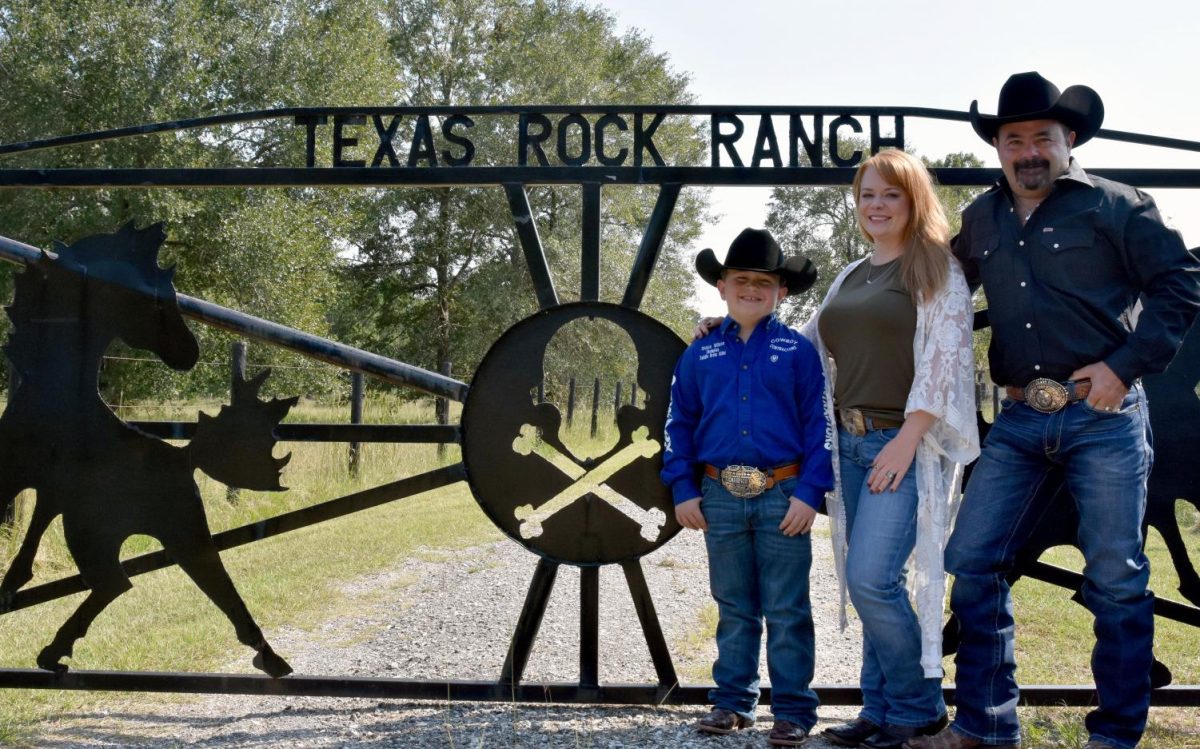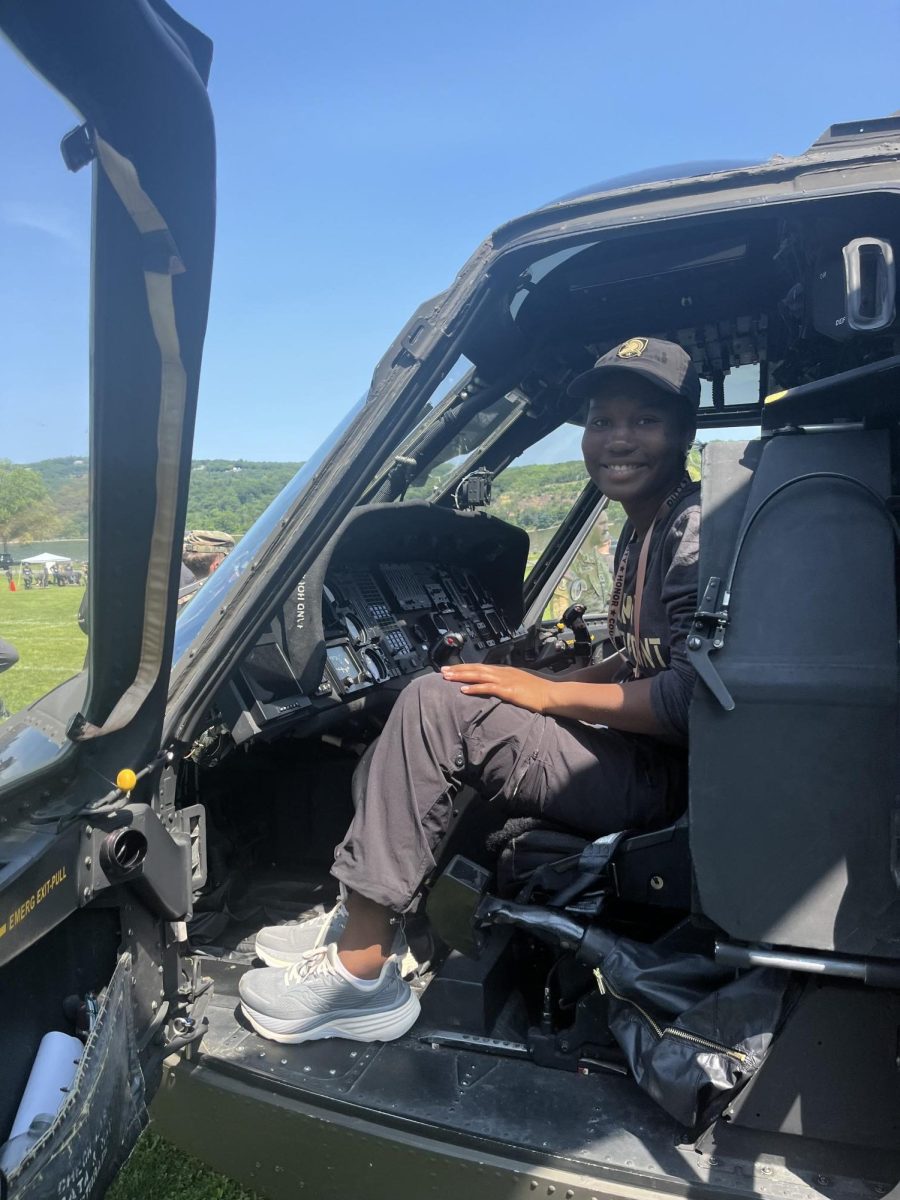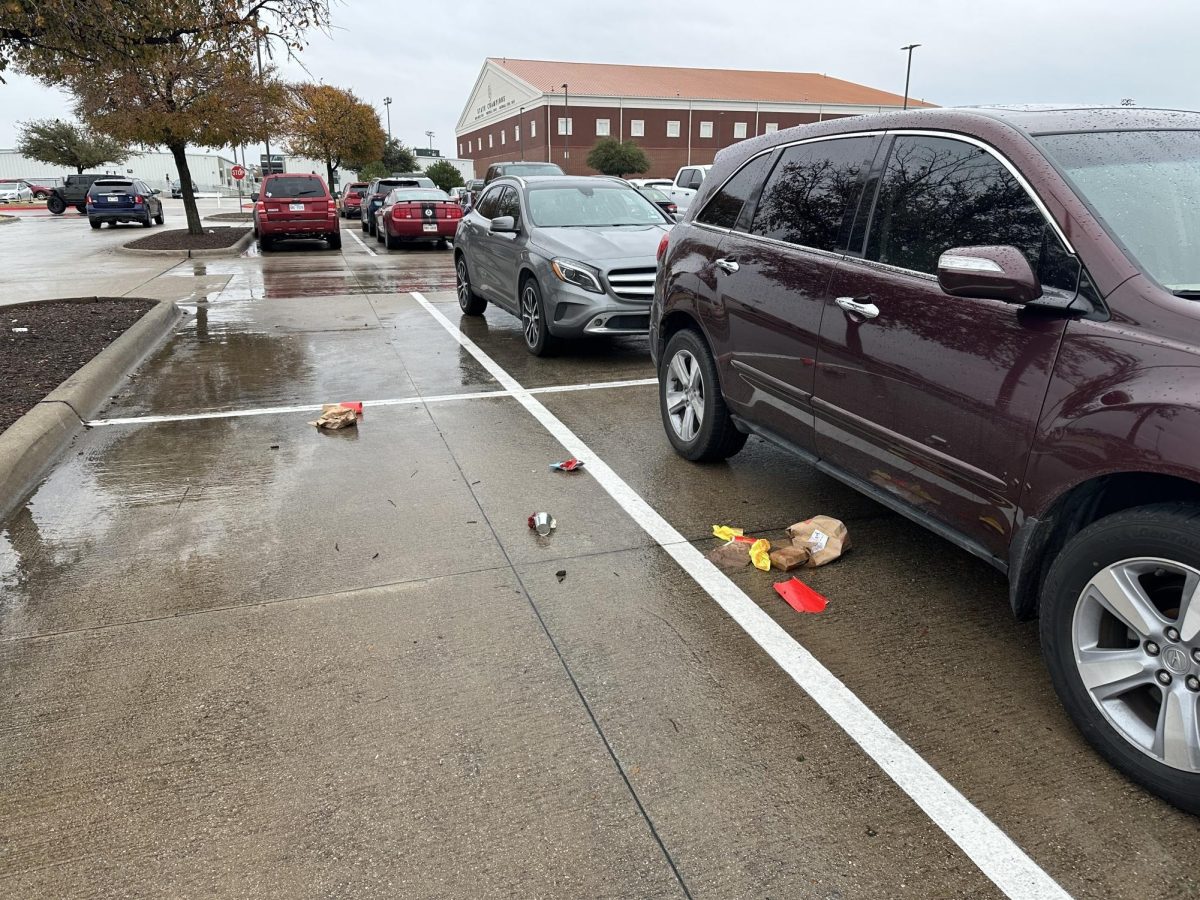A water bottle here, a McDonald’s to-go bag there – the trash in the Prosper High School parking lot can be seen almost everywhere.
As students come in and out of the parking lot, every day, there seems to be more and more trash, especially prevalent in the north parking lot. According to district police officer Sgt. Chris Reeves, he has seen an alarming amount of waste being thrown on the ground and left by students throughout the first semester of the 2024-2025 school year.
Under Health and Safety Code 365, it is illegal to litter in the State of Texas. Those who are caught littering could receive a ticket and a fine of up to $500. Despite these actions being illegal, students continue to throw trash on the ground every day.
“When you’re talking about (littering in) a parking lot and school facilities, you know, you want to see your student body take a little bit more pride in it,” Reeves said. “And by bringing attention to it, I think that’s what you do.”
Senior Katya Kondragunta, President of the ACE Environmental Club, said witnessing the trash makes her sad about the impact it leaves on the environment.
“It disheartens me to see the litter issue prevailing all throughout the campus, especially in the parking lot or on lunch tables,” Kondragunta said. “I believe that we need strong action to stop the littering problem and to also teach PHS students how to take environmentally conscious decisions.”
According to Reeves, most of the trash appears after the lunch periods. Reeves said he starts bicycle patrol around 1:30-2 p.m., and that’s when the trash becomes the most prevalent in the north parking lot and near the MPF.

(Courtesy of Seargant Chris Reeves)
“It’s blowing around everywhere,” Reeves said. “We’re not talking about a cup here, a water bottle there. We’re not talking about a straw wrapper. It’s disgusting. It’s horrible. Whenever you’re looking at the trash and it’s huge bags of Whataburger, Sonic, Wing Stop, Jersey Mike’s wrappers, 7/11 cups, Dunkin’ Donuts, you’re thinking, okay, so you know, it’s not sack lunches from home, right? Obviously, they (the students) are leaving campus. They’re not making any attempt to be discreet about it, and then it’s a slap to the professionals working at PHS and in their face when they can’t even discard it.”
Despite multiple students and faculty members noting the amount of trash in the parking lots, it’s not as prevalent in the front of the school. The administration and guest parking seem to be the cleanest, which is where Principal Nicholas Jones and some teachers park.
“I haven’t noticed much impact on our students from the trash in the parking lot,” Jones said. “For a school with close to 3,800 students, I think our students do an amazing job of keeping PHS and the campus clean.”
To show how serious the situation is, Reeves started photographing the trash, specifically in the north parking lot. He pointed out that it is not the entire student body contributing to the trash, but a handful of kids that could cause such a huge effect.
“I was actually astonished by the amount of trash,” Reeves said. “That’s why I photographed it. I’ve been approached by a lot of the student body in the parking lot saying, ‘Hey, what’s going on? What are you photographing?’ as well as reminding kids, ‘Hey I’m not photographing you, I’m photographing this trash.'”
One day, Reeves even took it upon himself to pick up the trash.
“Rather than just complain about it, I intentionally went and tracked down our custodians and got a large black trash bag,” Reeves said. “I went out there on the bicycle and filled that bag up (in) 20, 30 minutes just to kind of prove a point of how bad it’s gotten.”
Kondragunta said one of the roles the ACE Environmental Club has is picking up trash in the community.
“Our trash pickups play a large role in trying to get students to understand the firsthand impacts of littering in our communities.” Kondragunta said. “ACE has been conducting multiple trash pickups over the past few years. With collecting over 40+ bags of trash, we see that people who are participating in these trash pickups are learning more about their environmental responsibility and the importance of keeping our environment clean.”
Reeves said it is disheartening to see that even a custodian had to pick up an alarming amount of trash just from the parking lot.
“It kind of breaks my heart, you know, that day I was out there picking up a lot of trash and I saw one of our kind employees, our custodians with a huge trash can on wheels,” Reeves said. “I think, you know, she was trying to clean up, too. They shouldn’t have to do that, that’s demoralizing”
One of Reeves’ solutions is to make trash receptacles more visible, specifically having two to six in the parking lot, so that students would be more willing to throw their trash away rather than toss it on the parking lot.
“(If) they placed them periodically in the parking lot it would probably help,” Reeves said. “Look, you know, nobody wants full chicken burgers and hamburgers and fries and sauces (when they drive up), but, at the same time, if they’re placed in a good area, they’re more than likely to use it right. That’s why they have them at gas stations. You go to sporting events, they have them there, because if its convenient for people, they’re gonna do it.”
Since a lot of the trash is appearing during lunch time with students leaving, Reeves suggests that there be consequences if a student litters and allowing them to drive to school.
“We don’t speak for school administration, but I think some consequences could be loss of parking privileges and driving privileges,” Reeves said. “If there’s a repeat offender, at least the school (could have) some type of ‘Hey, you know, Tommy, you can’t drive your car for two weeks because you were seen on the cameras dumping a whole bag of McDonalds.'”
The last thing Reeves and the officers want to do is start handing out citations.
“People take it out of context if we do that. They’ll make it appear that we’re writing citations for once sauce packet.” Reeves said. “You’ll hear stories. ‘My window was down, the trash flew out,’ which isn’t accurate, right? You know, a massive bag of food came flying out the window. That’s when we would possibly entertain that idea.”
The amount of trash doesn’t just leave an impact on the students, but those who view PHS as a future place for their kids to go.
“There’s people that are touring the campus to see if they want their kids to go here, and they see all that,” Reeves said. “It’s just not a good look for the school.”
When it comes to the rest of the school and areas such as the southeast, southwest and front parking lots, some don’t notice as much trash in those areas.
“I never like to see trash in our building or parking lot area, but, for a school of our size, our students do a great job keeping The Ship clean,” Jones said. “We try to treat our students like adults and help them recognize that PHS is their school too, so keep it clean to help it look nice.”
Reeves said he hasn’t heard of this problem occurring at other schools in the district.
“Obviously with middle schools it’s gonna be a lot less common,” Reeves said. “I think that if we don’t look into this now, it’s gonna get worse and worse and worse, and then it could spread to other campuses, and, before you know it, someone might make TikTok video. It’s just not a good look, right?”
The ACE Environmental Club has made efforts to make the student body aware of the environmental causes of littering and the impact they have made.

“These pieces of trash end up getting blown away by the wind and then crowding under bushes or in grass fields where living creatures built their homes,” Kondragunta said. “This club has brought awareness to the issue of littering by initiating discussions throughout our meetings that bring up topics about the harmful impacts of littering, using disposable materials.”
With ideas of eliminating waste as a student community, Reeves said he believes we could make a difference in the community.
“I think that by us helping we can kind of put the work in, present it to them (the admin) and then ultimately, being admin, they release communication in and through conjunction with journalism in the ENN and in news,” Reeves said. “Let us and let everybody else help. I think they’d be more than more than willing to do that.”
In this new semester, Reeves said he hopes to see a change in the school community coming together to create a cleaner environment. By implementing more visible trash cans, he believes it could help keep the parking lots and school cleaner and show that as a community we have pride in how we represent ourselves.
“We’re always gonna have some kind of trash,” Reeves said. “It’s easy for us to see trash and pick it up. It’s even easier if there’s a trash can nearby, and there’s not very many of them or they’re all the way up at the door. It’s not gonna clean up itself. Students see the officer picking up trash. I think they go, ‘Wait, is that guy really picking up trash?’ It’s not beneath us. I think that with students and parents, even guests, (they don’t want to see) trash. I think (there should be more) pride. It goes beyond how we act. When you start this message students will be more inclined, not to dump out a bag of trash out the window. We kind of police each other.”
This story was originally published on Eagle Nation Online on January 16, 2025.

